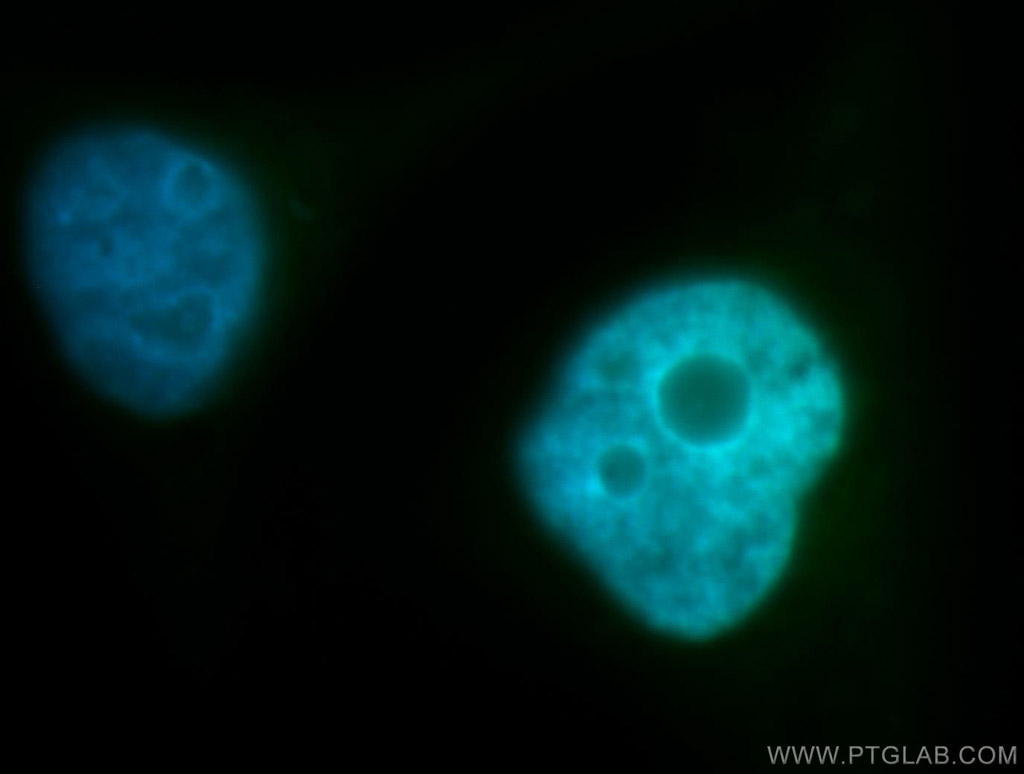验证数据展示
经过测试的应用
| Positive IF/ICC detected in | HepG2 cells |
推荐稀释比
| 应用 | 推荐稀释比 |
|---|---|
| Immunofluorescence (IF)/ICC | IF/ICC : 1:20-1:200 |
| It is recommended that this reagent should be titrated in each testing system to obtain optimal results. | |
| Sample-dependent, Check data in validation data gallery. | |
产品信息
10123-2-AP targets BUB3 in IF, ELISA applications and shows reactivity with human, mouse, rat samples.
| 经测试应用 | IF, ELISA Application Description |
| 经测试反应性 | human, mouse, rat |
| 免疫原 |
CatNo: Ag0167 Product name: Recombinant human BUB3 protein Source: e coli.-derived, PGEX-4T Tag: GST Domain: 124-253 aa of BC005138 Sequence: DPRTPCNAGTFSQPEKVYTLSVSGDRLIVGTAGRRVLVWDLRNMGYVQQRRESSLKYQTRCIRAFPNKQGYVLSSIEGRVAVEYLDPSPEVQKKKYAFKCHRLKENNIEQIYPVNAISFHNIHNTFATGG 种属同源性预测 |
| 宿主/亚型 | Rabbit / IgG |
| 抗体类别 | Polyclonal |
| 产品类型 | Antibody |
| 全称 | budding uninhibited by benzimidazoles 3 homolog (yeast) |
| 别名 | BUB3, BUB3L, hBUB3 |
| 计算分子量 | 37 kDa |
| GenBank蛋白编号 | BC005138 |
| 基因名称 | BUB3 |
| Gene ID (NCBI) | 9184 |
| RRID | AB_2066209 |
| 偶联类型 | Unconjugated |
| 形式 | Liquid |
| 纯化方式 | Antigen affinity purification |
| UNIPROT ID | O43684 |
| 储存缓冲液 | PBS with 0.02% sodium azide and 50% glycerol, pH 7.3. |
| 储存条件 | Store at -20°C. Stable for one year after shipment. Aliquoting is unnecessary for -20oC storage. |
背景介绍
BUB3 is a conserved component of the mitotic spindle assembly complex and is an essential compent of spindle-assembly checkpoint (SAC) signaling that operates during early embryogenesis. BUB3 null embryos treated with a spindle-depolymerising agent fail to arrest in metaphase and show an increase in mitotic disarray. In mitosis, the SAC prevents anaphase onset until all chromosomes have been attached to the spindle microtubules and aligned correctly at the equatorial metaphase plate. BUB3 is involved in promoting the establishment of correct kinetochore-microtubule (K-MT) attachments in mammalian oocyte meiosis.
实验方案
| Product Specific Protocols | |
|---|---|
| IF protocol for BUB3 antibody 10123-2-AP | Download protocol |
| Standard Protocols | |
|---|---|
| Click here to view our Standard Protocols |


